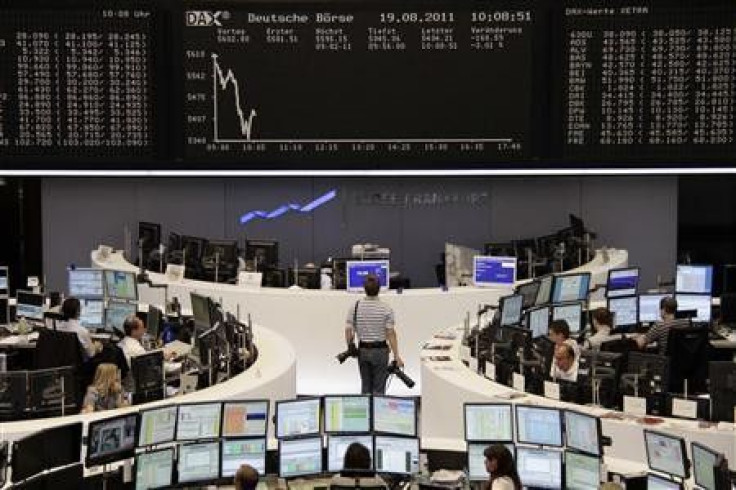Global Stocks Routed, Gold Soars

An ugly sell-off in global stocks gathered pace on Friday, on mounting concerns the U.S. economy is heading into another recession and as some European lenders faced a short-term funding crunch, highlighting the risk of a banking crisis.
Nervous investors fled to the safety of core government bonds, Swiss francs and gold, which hit a record high, with many seeking to unwind holdings of riskier assets such as stocks, commodities and higher-yielding currencies before the weekend.
European shares extended steep losses from Thursday, when they suffered their biggest daily slide in 2-1/2 years, with key indexes in Britain, France and Germany all deep in the red.
A short selling ban imposed on some of the region's stock markets last week has had little impact, with the FTSEurofirst index down 2 percent, having already lost 15 percent this month. It was on track for its worst monthly decline since at least 1997.
The MSCI world equity index was down 1.25 percent. It too has lost nearly 15 percent since the start of the month, and saw $1.4 trillion being wiped off valuations on Thursday and early on Friday -- equivalent to the size of the Spanish economy.
The heavy selling is on the back of fears over the state of global economic growth and the ability of European banks to withstand another freezing-over of credit markets, said Ben Potter, strategist at IG Markets.
The sharp decline in stock markets is expected to have an adverse impact on household wealth, further undermining consumer confidence and demand in coming months. Heightened uncertainty over growth could also see producers delaying decision-making, hitting global output.
These concerns are likely to see investors cut exposure to stocks, commodities like metals and oil and growth-linked currencies such as the Australian dollar in the coming days.
CRUNCH TIME
While investors fled stocks, spot gold hit a record high of above $1,860 an ounce, putting it on track for the largest weekly gains since February 2009. The metal has risen nearly 14 percent so far this month -- its best month since September 1999 -- benefiting from a deluge of safe-haven flows.
Oil prices fell, with Brent crude extending losses on renewed expectations of weak demand from the world's top oil consumer after a slew of lackluster U.S. data.
Brent fell as low as $105.80 a barrel, down more than $1 from the previous session, and has lost more than 9 percent this month, the worst slide since a near 15 percent drop in May 2010.
Earlier, a sharp decline in factory activity in the U.S. Mid-Atlantic region to the lowest level since March 2009 stunned investors and revived worries about a new recession in the world's largest economy.
An unexpected fall in existing U.S. home sales in July and a greater than expected rise in new claims for jobless benefits in the latest week also added to those concerns.
Renewed fears that the euro zone debt crisis could engulf the region's financial system put pressure on short-term funding markets, forcing some European banks to pay higher rates for dollar loans and reviving memories of the dark days of late 2009 after the collapse of Lehman Brothers.
There has been a panic about European banks. European governments are guaranteeing European banks, but if the governments are not stable themselves, that means the banks aren't stable, said Lothario Mendel, chief investment officer at Octopus Investments, which manages $4 billion.
Worries about a European banking crisis saw the euro drop against the dollar to $1.4299, down 0.2 percent on the day.
German Bund futures were supported near record highs as worries over a potential U.S. slump and the euro zone debt crisis provided underlying support for safe-haven assets.
© Copyright Thomson Reuters 2024. All rights reserved.











